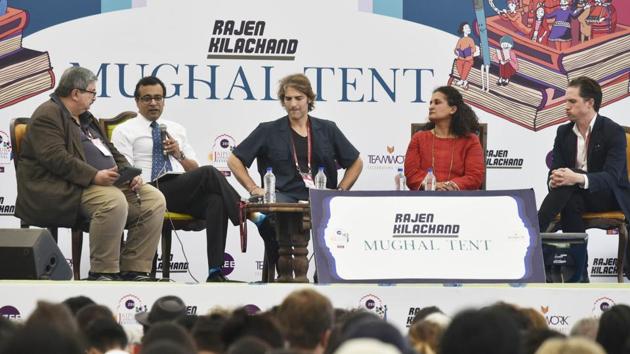The Rohingya crisis: More than theological, it’s time for informed political response
A session on the Rohingyas - which had writer-journalist Salil Tripathi in conversation with writer-journalist and Pulitzer Prize winner Jeffrey Gettleman, journalist Nick Perry, writer-journalist Praveen Swami and public health professional Shelley Thakral - at the Jaipur Literature Festival, examined the many angles to the human rights crisis.
“Since last August, close to 690000 people who identify themselves as Rohingyas have flooded into Bangladesh. They are fleeing a policy of massacres, rape, murder, intimidations and forced expulsions,” said writer and journalist Salil Tripathi, introducing the subject of a session on The Rohingya Crisis, and setting the tone for a grim discussion. “The number of deaths runs into a few thousand, and this is what can be identified. Probably, the number is much larger. The senior officials of the United Nations have called the crisis ‘crime against humanity’. Special rapporteurs have used the word genocide… An entire generation has grown up in refugee camps, which has known only starvation, lack of education and poor access to healthcare and infrastructure. Bangladesh is a reluctant host. There are apparently 40,000 Rohingyas in India and India wants to get rid of them,” said Tripathi, who was in conversation with writer-journalist and Pulitzer Prize winner Jeffrey Gettleman, journalist Nick Perry, writer-journalist Praveen Swami and public health professional Shelley Thakral.

For Jaipur Literature Festival full coverage, click here
The plight of the Rohingya refugees is such, that Jeffrey recalls, even though he has spent years in Africa covering wars and famines, he was deeply moved. He shared his experience of reporting from the Myanmar-Bangladesh border “trying to find a story that would grab people by the shoulder and shake them… As journalists we are in the empathy-generating business.” And then he met this young girl, about 20-years-old, frail and with scars on her face, who had witnessed her village being burned by the army, the men killed and the women raped. She had lived through having her little son being ripped out of her arms and thrown into the fire, before being repeatedly raped,” he said. “There are those who have said that the Rohingya crisis has been exaggerated. But we talked to dozens of other people from different parts of the Rohingya areas who told us about the exact same experience. And these people were not arranging some media PR glitz for my benefit… It left me feeling very helpless. As a journalist I end up hearing a lot of these stories. And you can give somebody a hug, you can tell them you are sorry. But there’s nothing you can do for them,” he added.
The story of the girl described by Gettleman is something Thakral hears frequently in camps as an aid worker. Their plight does not endear them to the locals – especially when the host country, in this case Bangladesh, is poor and densely populated, and the state is struggling to provide for its own people. The refugees are seen as competition for resources and the locals feel bitter for the aid given to them. While Bangladesh Prime Minister Sheikh Hasina has pledged support for the Rohingya refugees at the UN, Bangladesh and Myanmar have also reached some sort of an agreement for Myanmar to take back the Rohingyas. The principle of international refugee law, however, says that a refugee can’t be forced to return to his country, if he has a well-grounded fear of persecution there. “It is hard to imagine how anyone would voluntarily return. Everyone I spoke to fell into two camps. There were those who were like, ‘You got to be kidding me; I don’t have anything to go back to. I can’t believe this is even being proposed. And then there is this other camp which is the only condition on which I will return is if my citizenship is assured, reparations for our land and punishment for those who committed these crimes. Those conditions are hard to imagine Myanmar will agree to… The idea therefore that these people will go back is difficult to comprehend.”
In India, Swami feels, we are witnessing the unfolding of a “cynical kind of politics… to fan fear of the Muslim peril.” He added that if records are looked at “there is only one case of a Rohingya terrorist and that involves an alleged act of terrorism planned outside India’s border.” India’s attempt to send back Rohingyas, said Swami, is a periodic thing and nothing ever comes of it.
To understand the problem, he felt, one has to address the politics and political history of the situation. “Unless you have that you will have a theological response, not an informed political response, which is what you need to actually deal with the situation.” Swami’s comment brought in focus the history of the Rohingya problem – the fact that Myanmar believes they are from Bangladesh, which the latter nation doesn’t agree with, and whether the root of the problem is the way the borders of these countries were drawn when they gained independence from the British.
The discussion also touched upon Aung San Suu Kyi’s attitudes towards the Rohingyas and if she was helpless in controlling the situation. In conclusion, Tripathi, while referring to the nature of the panel, hoped, “that through realism and through diligent reporting of these issues, one hopes, there will be a better future for them”.
Follow @htlifeandstyle for more





